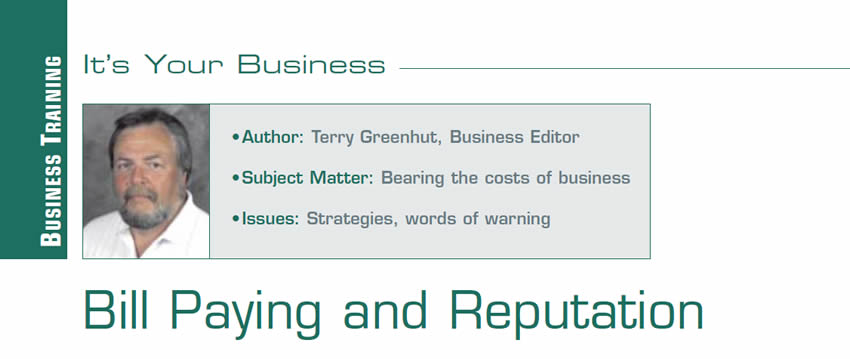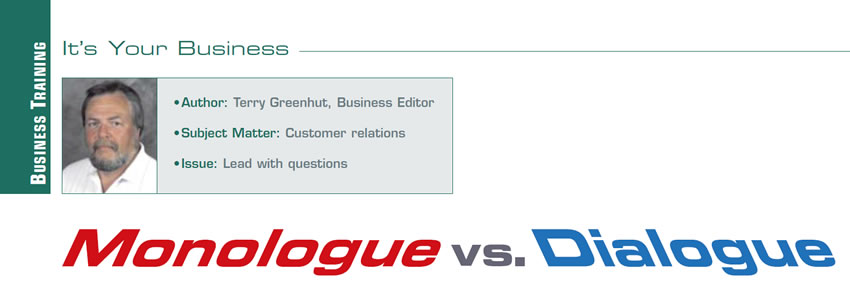Bill Paying and Reputation
Paying bills is one of the most difficult things we have to do in business for a number of reasons. One that always bothered me was that the money I worked so hard to get didn’t even have a chance to get all warm and comfortable in my checking account before I had to take it out to pay bills. The old “hard-come, easy-go” scenario. It was almost like the money was never really there. Time is another factor. The time it takes to pay bills pulls you away from money-making activities, and we all know that’s where we should be placing most of our energy. Of course some of us have bookkeepers to help with the bill paying, but often we need to get involved anyway to determine who needs to get paid now, who can wait longer, and how much we can pay each creditor.

Honesty, Here’s My Wallet
If I encounter a sales rep who even remotely sounds like he’s trying to feed me B.S., I’ll take my money elsewhere – simple as that. Once trust in the individual is broken, it makes you question the honesty of the company – and products.

How Fortunate We Are!
Did you ever stop to think about how fortunate we are to live in a place where we can ply our trade with only minor guidelines imposed by government agencies, a place where we can get what we need so quickly that we get bent completely out of shape if we call the local parts store for a delivery and the driver doesn’t show up within 20 minutes with the exact right part in his hand? We tend to take all that for granted, but there are many places in the world where that kind of luxury just doesn’t exist.

It Ain’t All About You
I hate managers who brag on themselves to the customer. Makes me want to puke. They are absolutely missing the point. They should be bragging on the owner of the shop and the technicians who work there. That is what the customer wants to hear.

If You Built Your Team with a Fantasy Football Strategy
There are many ways for a manager to pick a “dream team” for the upcoming season, from high-risk to top-dollar and everywhere in the middle. Some of the methods are great, while others leave you with less than you started with.

If You Don’t Tell Lies, You Can’t Get Caught in One
Upon arrival I noticed that all three service advisers were on the telephone. There were no other customers waiting at the counter. I could overhear their phone conversations and it didn’t sound to me like any of them were talking with customers about their vehicles, yet not one of them bothered to greet me or cut their conversations short. Standing there that way for what seemed like an eternity made me feel very out of place, but I wrote it off. After all, I’m new to the area. Maybe that’s the way they do things here.

There’s No Excuse
Great people throughout history have chalked up numerous failures before succeeding at whatever their chosen profession or goal. Is it OK to fail? Sure it is, and sometimes often and quite miserably, before finally reaching your ultimate triumphs. Business owners don’t always make it on the first try or the second or third for that matter. Inventors often try and fail hundreds of times before finding a solution. Did you know that the famous artist Van Gogh only sold one painting in his lifetime, all the rest sold after he died, but that never stopped him from painting? Henry Ford went bankrupt five times. Albert Einstein was expelled from school for being a terrible student. Winston Churchill lost every election in which he ran until he became prime minister at age 62.

‘Bossypants’: The Art of Creatively Hiding Business Insight
At first glance, it looks like a regular ol’ memoir about a working-class person hustling her way to success in entertainment. Kind of like a Drake song with better prose. And, yeah, that’s the gist of “Bossypants,” but it’s a lot more than that. It’s about overcoming insecurity and kicking a$s in the male-dominated comedy business, all while dishing out some hard truth on leadership, growing a career, and work-life balance.

Keeping Up with Change
I come from a time in this industry when building a transmission was a simple thing. Of course we didn’t know it then. The problems we faced looked just as big to us way back when as the ones you now face. We were dealing with hydraulic pressure and vacuum with just the slightest bit of electricity thrown in, but even then, that kickdown solenoid that didn’t work could have us scratching our heads for quite a while. Today you have lots of solenoids, sensors, and one or several computers to deal with, and if you’re a rebuilder or a troubleshooter you’d better know how they all work and what to do when they don’t or your shop will lose an awful lot of money.

Where Did All the Good Customers Go?
Every 3,000 miles, I get to make a decision – where to take my car in for an oil change. Typically, I take it to my usual place, so it’s kind of a non-decision. But on my most recent visit, their customer service was particularly terrible.

Monologue vs. Dialogue
A two-way conversation in which both parties are giving and receiving information is a dialogue, and it’s what is needed to make successful sales. You may be the sharpest knife in the drawer when it comes to mechanical skills. You might even be great at handling customer situations and problems after the sale, but if you can’t have a successful dialogue with a potential customer over the phone or when they pay a visit to your shop, those wonderful attributes won’t mean a thing because you won’t be making profitable sales.

Bless Their Hearts: Selling the Diagnosis
Words are all we have, but the right words can be a very effective weapon. Look at it this way. If we cannot sell a free diagnosis on the phone, we are not going to sell a transmission repair. Your best bet is to position yourself as the friendly guy at an honest shop that has a free diagnosis that saves the customer $200 off the dealership price for a diagnosis. You won’t get them all, but statistics show that your chances of getting a sale are better than those of the shops giving lowball prices over the phone. It is a percentage bet. So, for you managers out there who think you have a better solution, I just have to say to you, “Good luck with that and bless your heart.”

